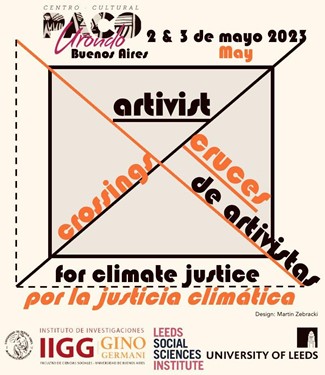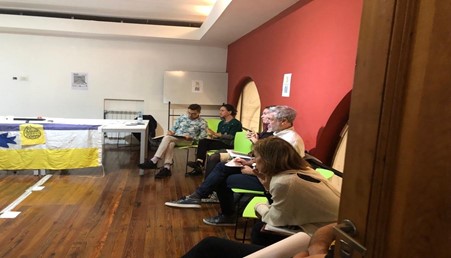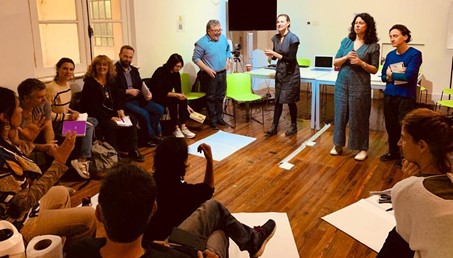Artivist Crossings - How can Methods of Art and Activism Cross Social and Climate Justice?
Collaboration between the Universities of Buenos Aires & Leeds

Artivist Crossings event poster/Cartel del evento Artivist Crossings. Design/Diseño: Martin Zebracki
Cruces de artivistas:
Cómo pueden los métodos del arte y el activismo cruzar la justicia social y climática?
English version – Versión en español, disponible más abajo
Artivist Crossings is a new partnership between Leeds and Buenos Aires that examines methods at the intersection of art and activism, or ‘artivism’, in addressing the intertwined nexus of climate change and social justice.
The recent reports of the United Nations Intergovernmental Panel on Climate Change (IPPC) stress that the climate crisis is more pressing than ever before, calling us to use our concerted expertise to build more efforts to examining the potential of artivist methods as a critical response to this crisis.
Artivist Crossings aims to enhance horizontal knowledge exchange and networking between the universities of Leeds and Buenos Aires and activists, artists, and arts organisations in local and regional contexts of Argentina.
In a first step of this project, we organised knowledge exchange workshops at the Instituto de Investigaciones Gino Germani at the Universidad de Buenos Aires (UBA) on 2 and 3 May 2023. This allowed us to establish a common space for critical learning about the strategic uses of methods of art and activism for examining the climate crisis, raising awareness, co-producing responses, as well as finding potential solutions in policy and practice.
The relationships between our project team and collaborators as well as our learnings of different realities are also shaped outside of meeting rooms. Therefore, we supplemented the workshops with networking activities including informal gatherings, luncheon meetings, and urban explorations that led to some spontaneous discoveries at the intersection of art, activism and the environment.
We designed the workshops as a welcoming and stimulating environment that embraces diverse, and occasionally contrasting perspectives, underpinned by shared values of collaboration and inclusivity. The participants shared their insights on current practices, raised thought-provoking ideas, and discussed societal impacts and future aspirations (both in concept and practice) through engaging modes of audiovisual presentations, mind-mapping exercises, and roundtable discussions.

Presentations and peer feedback / Presentaciones y comentarios de les compañeres. Photo / Fotografía: Maria Rovisco

Mind-mapping exercise: What are the problems, tools, and solutions in your work around art, activism, and climate justice? / Ejercicio de mapeo: ¿Cuáles son los problemas, las herramientas y las soluciones en tu trabajo en torno al arte, el activismo y la justicia climática? Photo / Fotografía: Martin Zebracki
The workshops proved to be a valuable ‘sandbox’ for mutual learning and experimentation. At the same time, we navigated challenges and opportunities of using art and activist methods in tackling climate crisis issues.
Common themes that emerged from the discussions – and which will inform our future thinking and activities – encompass the following (non-exhaustive) summary:
- extractivism, broadly defined as environmental depletion, political pressuring, and knowledge extraction;
- resistance against social injustices and exclusions; and
- empowerment for more egalitarian communities and inclusive futures.
Moreover, our debates highlighted the importance of centring community voice in the intersectional analysis of vulnerabilities, marginalisation, and processes of exclusion amidst rapid environmental change.
We realise there is still a lot of concerted work to be done to deepen, challenge, and bridge dialogues between diverse Majority World (Global South) and Minority World (Global North) knowledges and communities of interest. We foster the ambition to expand this project with follow-on cross-sector and multidisciplinary activity that sustains our partnership and provokes international comparative scrutiny.
Last but importantly, we will seek to enhance participation from communities that are affected most by the climate crisis so that we can collectively learn and influence policy and practice for inclusive action.
Stay tuned for more artivist crossings.
Acknowledgements:
We owe a debt of gratitude to the below workshop participants, belonging to different areas of activism and the arts, who made this event happen and who allowed their wealth of knowledge, practices, and lived experience to be shared and heard:
- Unión de Asambleas de Comunidades de Chubut & Red Nacional de Acción Ecologista (RENACE): Pablo Palicio
- Cátedra Abierta de Pueblos Originarios– Memoria y recuperación, UNPSJB Sede Trelew & Cooperativa Cultural Espiral : Andrea Despó
- Red Ciudadana: Secretaria de Ecología Popular Movimiento Evita, Arte en Red: Silvia Arnaldo
- Art : Diego Germán Gómez
- Centro Cultural de Arte (CRA): Elina Rodriguez &Maria José Trucco
- Colectivo Dominio Público : Fagner Pavan & Laura Peña
Also we would like to extend our sincere thanks to Paco Urondo University Cultural Centre and especially its director Nicolás Lisoni, Jorge Blanco, Subsecretario de Políticas Ambientales, Facultad de Filosofía y Letras-UBA, Dr Emilio Ayos, IIGG Researcher and Coordinator of the LSSI-IIGG programme, and the doctoral fellow Rocío Arisnabarreta at the Instituto de Investigaciones Gino Germani at the Universidad de Buenos Aires for being such generous hosts.
Moreover, we would be ‘lost in translation’ without the stellar language interpretation by Natalia Barry who enabled us to cross Spanish and English wor(l)ds of (un)knowing.
And there would be no artivist crossings without the financial support awarded by the Leeds Social Sciences Institute (LSSI).
About the project:
Artivist Crossings is funded by the LSSI–UBA International Strategic Research Partnership Fund and involves a multidisciplinary collaboration between the human geographer Dr Martin Zebracki (Project PI, School of Geography, University of Leeds) , sociologist Dr Maria Rovisco (Project Co-I, School of Sociology and Social Policy, University of Leeds), and performance studies academic Dr Lorena Verzero (Project Co-I, Instituto de Investigaciones Gino Germani, Universidad de Buenos Aires, UBA & Consejo Nacional de Investigaciones Científicas y Técnicas, CONICET.
Versión en español
Artivist Crossings es una cooperación emergente entre Leeds y Buenos Aires que se propone abordar las relaciones entre cambio climático y equidad social a partir de la exploración de métodos de trabajo en la intersección del arte y el activismo, o en el "artivismo".
Los recientes informes del Grupo Intergubernamental de Expertos sobre el Cambio Climático (IPPC) de las Naciones Unidas subrayan que la crisis climática es más acuciante que nunca, lo que nos convoca a aunar experiencias y dedicar más esfuerzos a explorar el potencial de las herramientas artivistas como respuesta crítica a la crisis.
Artivist Crossings aspira a potenciar el intercambio de conocimientos horizontal y promover el trabajo en red entre las universidades de Leeds y de Buenos Aires, junto con activistas, artistas y colectivos artísticos de distintas zonas de Argentina.
En un primer paso de este proyecto, organizamos talleres de intercambio en el Instituto de Investigaciones Gino Germani de la Universidad de Buenos Aires durante los días 2 y 3 de mayo de 2023. Esto nos permitió generar un espacio común para el desarrollo de conocimiento crítico respecto de los usos estratégicos de los métodos y de las herramientas artísticas y activistas para abordar la crisis climática, generar conciencia, co-producir respuestas y encontrar posibles soluciones en los terrenos de lo político y de la acción.
Las relaciones entre el equipo organizador y les colaboradores, así como el aprendizaje de las distintas realidades, también se forjan fuera de las salas de reuniones. Por ello, complementamos los talleres con actividades de fortalecimiento de los vínculos, como reuniones informales, almuerzos de trabajo y exploraciones urbanas que dieron lugar a algunos descubrimientos espontáneos en la intersección del arte, el activismo y el medio ambiente.
El espacio de los talleres tuvo la intención de constituirse en un entorno cálido y estimulante en el que tuvieran cabida perspectivas diversas y, en ocasiones, contrapuestas, respaldadas por valores de colaboración e inclusión. Les participantes compartieron sus prácticas actuales, pusieron en común ideas provocadoras, repercusiones sociales y aspiraciones futuras tanto conceptuales como relativas a la práctica, a través de presentaciones audiovisuales, ejercicios de mapeo y debates en mesas redondas.
Los talleres resultaron ser un valioso "cajón de sastre" para el aprendizaje mutuo y para la exploración que nos permitieron navegar por los retos y oportunidades que ofrecen el arte y el activismo como modos de abordar problemas emergentes de la crisis climática.
Aunque no se trata de un resumen exhaustivo, los temas comunes que surgieron de los debates y que servirán de base para nuestras reflexiones y actividades futuras son los siguientes:
- extractivismo, definido en sentido amplio como agotamiento medioambiental, presión política y extracción de conocimientos;
- resistencia a los avasallamientos, las injusticias y la exclusión social; y
- empoderamiento para lograr comunidades más igualitarios y futuros más inclusivos.
Además, los debates pusieron de relieve la importancia de centrar la voz de la comunidad en el análisis interseccional de las vulnerabilidades, la marginación y los procesos de exclusión en el contexto de un veloz cambio medioambiental.
Somos conscientes de que aún queda mucho trabajo por hacer para profundizar, cuestionar y tender puentes de diálogo entre los conocimientos y las comunidades de interés del mayoritario (Sur Global) y del minoritario (Norte Global). Fomentamos la ambición de ampliar este proyecto con una actividad de seguimiento intersectorial y multidisciplinar que sostenga nuestra colaboración y propicie análisis comparativos internacionales.
Por último, pero no por ello menos importante, es nuestro propósito potenciar la participación de las comunidades más afectadas por la crisis climática, de modo que podamos aprender colectivamente e incidir en la política y la práctica en favor de acciones integradoras.
¡Estén atentes, porque habrá más cruces artivistas!
Agradecimientos:
Debemos una profunda gratitud a les participantes, pertenecientes a zonas diversas del activismo y de las artes, que se citan a continuación, que hicieron posible este evento y compartieron la riqueza de sus conocimientos, prácticas y experiencias:
- Unión de Asambleas de Comunidades de Chubut & Red Nacional de Acción Ecologista (RENACE): Pablo Palicio
- Cátedra Abierta de Pueblos Originarios– Memoria y recuperación, UNPSJB Sede Trelew & Cooperativa Cultural Espiral : Andrea Despó
- Red Ciudadana: Secretaria de Ecología Popular Movimiento Evita, Arte en Red: Silvia Arnaldo
- Art : Diego Germán Gómez
- Centro Cultural de Arte (CRA): Elina Rodriguez &Maria José Trucco
- Colectivo Dominio Público : Fagner Pavan & Laura Peña
También queremos extender nuestro sincero agradecimiento al Centro Cultural Universitario Paco Urondo y especialmente a su director, Nicolás Lisoni; así como también a Jorge Blanco, Subsecretario de Políticas Ambientales de la Facultad de Filosofía y Letras-UBA; al Dr. Emilio Ayos, Investigador del IIGG y Coordinador del programa LSSI-IIGG; y a Rocío Arisnabarreta, becaria doctoral CONICET del Instituto de Investigaciones Gino Germani (IIGG) de la Universidad de Buenos Aires, que se desempeñó como asistente en la organización del encuentro. A todes, gracias por su generosa hospitalidad.
Además, estaríamos "perdides en la traducción" sin la maravillosa interpretación de Natalia Barry, que nos ayudó a atravesar los umbrales del (des)conocimiento entre el español y el inglés.
Y no habría cruces artivistas sin el apoyo financiero del Instituto de Ciencias Sociales de Leeds (LSSI).
Acerca del proyecto:
Artivist Crossings está financiado por el Fondo Internacional de Asociaciones Estratégicas de Investigación LSSI-UBA y cuenta con la colaboración multidisciplinar del especialista en geografía humana Dr. Martin Zebracki (IP del proyecto, Escuela de Geografía, Universidad de Leeds); la socióloga Dra. Maria Rovisco (Co-I del proyecto, Escuela de Sociología y Política Social, Universidad de Leeds); y la investigadora especializada en estudios de performance Dra. Lorena Verzero (Co-I del proyecto, Instituto de Investigaciones Gino Germani, Universidad de Buenos Aires y Consejo Nacional de Investigaciones Científicas y Técnicas (CONICET) .
About the project:
Artivist Crossings is funded by the LSSI–UBA International Strategic Research Partnership Fund and involves a multidisciplinary collaboration between the human geographer Dr Martin Zebracki (Project PI, School of Geography, University of Leeds), sociologist Dr Maria Rovisco (Project Co-I, School of Sociology and Social Policy, University of Leeds), and performance studies academic Dr Lorena Verzero (Project Co-I, Instituto de Investigaciones Gino Germani, Universidad de Buenos Aires, UBA & Consejo Nacional de Investigaciones Científicas y Técnicas, CONICET.
